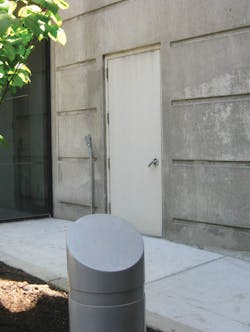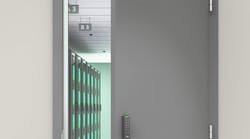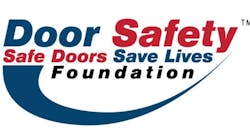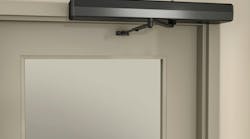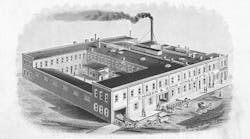For many years, proper and improper door hardware has been installed into fire rated doors and frames. Most who installed the locks, exit devices and door closers were performing work for their customer to the best of their abilities. Usually, the installations were accomplished in a timely and efficient manner without much thought at to whether or not the doors and frames were a listed and labeled fire door assembly. Many electrified locksets and electric strikes were installed into doors that frankly, should not have been modified since the National Fire Protection Association (NFPA) 80 Standard was revised in 1991. Because of this, the code regarding field-installed door hardware has become increasingly more stringent.
Since the 1991 Edition of NFPA 80, the code has expressly stated what field modifications could be done and by inference, if it was not in the Standard, you could not perform a modification. Many were unaware, or unwilling to follow the provisions listed in the Standard.
As a result, Annual Fire door inspection has been on the books since 2007 when the NFPA included a provision for an annual inspection requirement of fire listed assemblies.
In the past three years, 28 states have adopted the International Code Councils’ International Fire Code, and/or the International Building Code (IFC and IBC respectively). In those 2009 Code revisions, NFPA 80 is referenced, making the NFPA 80 Standard a part of the code adopted by the Authority Having Jurisdiction. This means, in plain language, that the new, more stringent requirement for Annual Fire Door Inspections is de rigueur in those jurisdictions. English meaning "strictly required".
Because the new code requires Annual Fire Door Inspections, many LAHJ’s (Local Authorities Having Jurisdictions) are finding that they are required by law (once they adopt, they must follow the code) to institute a program for Annual Fire Door Inspections in their jurisdiction.
Unfortunately, this requirement could not come at a worse time for local, city and state fire protection officials, since the economy has required them to make tough choices in regards to personnel. Essentially, they are almost all short-handed and do not currently have the staffing to inspect every facility in their jurisdiction that includes listed fire door assemblies.
This enormous problem has created an opportunity for enterprising professionals who have experience and knowledge in how doors and hardware work.
For a start, locksmiths who are interested must have Errors and Omissions insurance as many building owners will not permit lock work or fire door inspection without being assured that their inspector is covered for such liability. The recommended amount is usually $1 million, but some property owners may require a $2 million aggregate policy.
Bonding is not currently something that is called out for, unlike for most state requirements for locksmiths.
Q & A: IFDIA President Garrett Tom
To obtain important information regarding fire door inspection and locksmiths, I decided to reach out to Garrett Tom, president of the International Fire Door Inspector Association (and a sitting member of the NFPA 80 technical committee) and ask him how professionals in our field of work might benefit from the new annual requirement. Following is a brief interview:
Garrett, we have been hearing for years about how these inspections were coming our way, and frankly, many of us have not seen much action in this area. Can you tell me if we will start to see more jurisdictions begin to enforce the Annual Fire Door Requirement?
The IFDIA has been hearing from many FPOs (fire protection officials) who are trying to plan for the annual requirement, and are searching for the best way to enforce the code requirement. We provide them with material and information that they find valuable and try to help guide them in how to obtain the necessary personnel resources. Since the IFDIA is an association of Fire Door Inspectors, property owners and AHJs, we have a better feel for the pulse of what is happening in other parts of the country. I can state, that clearly, many jurisdictions are working feverishly to provide for annual fire door inspections.
That’s all well and good, but how does the requirement translate into a potential monetary gain for locksmiths and other security professionals?
Early on, the IFDIA determined the locksmith’s skill set and knowledge developed through daily work on fire door assemblies would be an excellent person to do the inspection.
There are many people who work on doors, but many of those who do so, only work on a door from time to time. The local locksmith is viewed by his customer as a professional in regards to doors and hardware. Building and property owners almost always call their locksmith to fix a piece of hardware or repair a door. For this reason, we decided to tailor our accredited training program to the locksmith field and other qualified persons.
When you say “tailor”, what exactly does that mean? How is the IFDIA training program tailored to the locksmith professional?
For example, we designed a quiz that must be taken before a student is allowed to take our online course. Many of the questions on that quiz (we call it the pre-qualification exam) are based upon the generalized knowledge that most locksmiths have due to their many years of work on doors and frames. Any person can take the free quiz, but we have found that in order to pass the free quiz, the test taker must have some very specific knowledge about door assemblies. Since the test is fairly tough for those without the requisite knowledge, it can be a difficult exam to achieve a passing score. Currently, our accreditation requires anyone who wants to take the Advanced Swinging Type Fire Door Inspector Course to pass the free exam with a score of 80 percent or better.
Is the IFDIA training program the only way a locksmith or other security professional can get into the business of fire door inspections? I mean, can’t they just go out and offer to inspect fire doors for their customers?
Jerry, to answer your first question, no…there are other training programs. In fact, several programs exist to train people to inspect fire doors and in reality, to answer the second part of your question, the Standard (NFPA 80) only calls for someone to inspect who has “knowledge” of the type of hardware to be inspected. The caveat to this is that the LAHJ often may not be familiar with the level of knowledge of any particular person who inspects fire doors. Because the LAHJ may not have individual knowledge regarding specific skill sets, for specific people, they are most likely to lend more credence to a third party verification of a particular person’s knowledge. This is what the IFDIA and other training agencies provide -- a third party verification of the fire door inspector’s skill set. The IFDIA also uses third party verification of our swinging type fire door inspection training curriculum, by being accredited by the International Accreditation Services (IAS), a sister company of the ICC.
Assuming someone would want to become a fire door inspector and provide inspection services to their customers, what steps should he or she take?
Well…they could simply go to the LAHJ and provide them with a resume of their experience, and if, after review, the LAHJ is comfortable with their knowledge base, the LAHJ may very well agree to review reports submitted to them by the locksmith. They can also take a training program, either the accredited IFDIA curricula or other acceptable program and go to the LAHJ with their certificate.
If someone did want to provide inspection reports to the AHJ, what format would the forms have to take? Are there special forms or requirements?
The IFDIA has found that many jurisdictions are just beginning to try to implement the requirement and as such, they do not have any specific format for the forms that are submitted. When someone who has participated in a recognized training program joins the IFDIA as a free member, they have access to our free report writing software. The system we built is deceptively easy to operate, considering that the database is very complex. Essentially, our members can submit fire door inspection reports with the click of a button.
Just a moment ago, we were speaking of the AHJ, or LAHJ. How exactly does a locksmith find out who the LAHJ is?
We have been asked this question numerous times and the answer is really quite different for many situations. For instance, in some jurisdictions, the LAHJ is the fire marshal; in others, it is the fire chief. In some jurisdictions, it is the planning department or the city engineer, or any number of other officers in the jurisdiction. The best way to find out who the LAHJ is for a particular jurisdiction is to simply start calling. Call your city or county clerk, call the fire department and ask who is in charge of code enforcement. Someone will have the knowledge needed and point a person in the right direction. Once the correct official is found, it only takes setting up a meeting to determine if that person will accept reports from a locksmith, or will only accept reports from someone whose knowledge skill set has been verified by a third party.
Thanks for your time. If someone has questions, whom should they call? Can they obtain further information online?
My pleasure. Sure, people can contact us, or the other agencies that train people. Someone could simply do a web search and all sorts of information will pop up. This field really is growing and many jurisdictions are looking for a way to implement the requirement.
The International Fire Door Inspector Association can be reached at Telephone 888-541-0827 or Web Site: www.ifdia.org.
